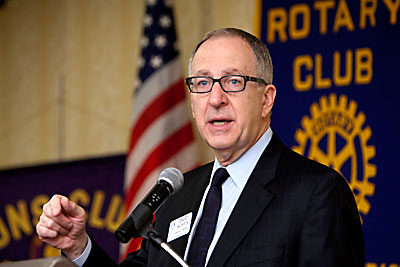Skorton talks about sustainability, community partnerships at service breakfast
By Nancy Doolittle

President David Skorton struck a tone of sobriety and optimism in his remarks at the annual Joint Service Clubs Breakfast Talk May 18 at the Ithaca Holiday Inn.
"This has been another eventful and challenging and ultimately positive year for our area," he said.
Speaking to about 150 members of Rotary, Kiwanis, Lions and Sertoma clubs and other local service organizations, Skorton talked about Cornell's progress in sustainability, its partnerships with community organizations and student concerns.
This past year, "unbelievably robust progress" has been made, Skorton said, noting that the Atkinson Center for a Sustainable Future has brought together more than 230 Cornell faculty members who have garnered more than $75 million in external support for research in such areas as natural gas drilling, sustainable local foods and agriculture, and the use of powdered hardwoods for biofuel.
On campus, Skorton cited the operation of the combined heat and power plant, the end of coal energy on campus, and the commitment to build LEED (Leadership in Energy and Environmental Design) certified new construction in projects costing more than $5 million.
Skorton noted that the Tompkins County Climate Protection Initiative recently received Cornell's "Partners in Sustainability Award."
Turning to finances, Skorton said that because Cornell has worked through most of its budgetary difficulties, it is beginning to hire faculty. Faculty hiring is a lead indicator of a university's vitality and will help the local economy as well, he said.
Skorton highlighted the Cornell Student United Way Campaign; collaborations between the Ithaca School District and Cornell; and the implementation of "means restriction" on university and city-owned bridges.
Asked about recent student deaths, Skorton, Vice President for Student and Academic Services Susan Murphy and Tim Marchell, Gannett Health Services' director of mental health initiatives, talked about students living in off-campus housing, the university's comprehensive approach to student mental and emotional health, and ways in which Cornell is joining with other universities to determine best practices to deal with these issues.
Would lowering the drinking age to 18 help eliminate of the mystique around drinking? Skorton said that from a medical perspective, data shows that raising the drinking age to 21 resulted in a decrease in alcohol-related deaths.
On the future of the liberal arts, Skorton said Cornell expects a significant percentage of its faculty hires to be in the humanities.
Responding to concerns about the Africana Studies and Research Center, Skorton said he is "100 percent committed to having one of the top Africana programs in the country," noting that the university will increase the center's budget by more than 50 percent over the next five years.
Skorton closed by pledging that Cornell will continue to increase its engagement with, and commitment to, the local community.
Media Contact
Get Cornell news delivered right to your inbox.
Subscribe